A Child Is Born

Brief Synopsis
Cast & Crew
Lloyd Bacon
Geraldine Fitzgerald
Jeffrey Lynn
Gladys George
Gale Page
Spring Byington
Film Details
Technical Specs

Synopsis
Jed Sutton comes to the maternity ward of a large hospital to visit his wife Grace, a convicted murderess who has been released from prison only long enough to give birth to her child. Soon after, Mrs. Mamie West also arrives on the maternity floor to give birth to her seventh child, and is greeted by Miss Bowers, the head nurse. Before seeing his wife, Jed is called into consultation by Dr. Lee, who informs him that Grace is in a severely weakened condition. Grace's plight wins the sympathy of Miss Bowers, who smuggles Jed into see his wife, against the orders of the prison matron. Other patients in the ward are Florette Laverne, a vaudeville dancer who doesn't want her baby because her husband Harry has threatened to leave her and get a new partner for his act; Gladys Norton, an eighteen-year-old who is secretly married and fears the reaction of her mother; Mrs. Kempner, who desperately wants a child even though the doctors have told her that she can never bear one; and Mrs. Helen Banks, whose frantic husband Ringer paces the waiting room. When Florette receives a telegram from Harry notifying her that he has found a new partner and is leaving her, she decides to put her twin babies up for adoption. As Grace's condition worsens, she tells Jed that she no longer wants to live and asks him to care for their baby. Jed insists that his wife's life is more precious than that of his child, but when Dr. Lee is blinded in a laboratory accident, another doctor is assigned to the case and Grace instructs him to save the infant at any cost. Meanwhile, Florette experiences a change of heart and decides to keep her twins and Mrs. Kempner, who has lost her baby, offers to care for the children while Florette is on the road. Jed, informed that his wife has died in childbirth, is about to leave the hospital when Miss Bowers hands him his infant with a dying message from Grace that she wants her life to begin again in their baby.

Director

Lloyd Bacon
Cast

Geraldine Fitzgerald

Jeffrey Lynn
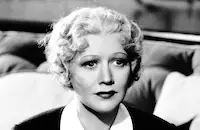
Gladys George

Gale Page

Spring Byington
Johnnie Davis
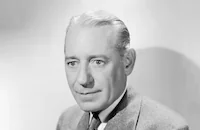
Henry O'neill

John Litel

Gloria Holden
Johnny Downs
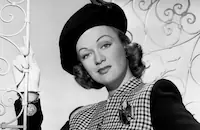
Eve Arden

Fay Helm

Louis Jean Heydt

Nanette Fabares
Jean Sharon
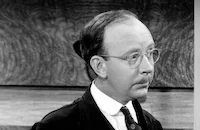
Hobart Cavanaugh

George Irving

Nella Walker
Winifred Harris
Esther Dale
Ed Gargan
Edgar Dearing
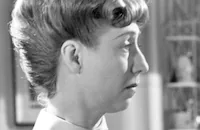
Marie Blake

Maris Wrixon

John Ridgely
Charles Marsh
De Wolfe Hopper
Carlyle Moore Jr.
Owen King
Sibyl Harris
Creighton Hale
Buz Buckley

George O'hanlon
Garry Owen
Sidney Bracy
Jeffrey Sayre
Claude Wisberg
Frank Mayo
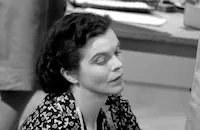
Dorothy Adams
Frances Morris
Marie Wells
Georgia Caine
Virginia Brissac
Georgia Cooper

George Meeker
Crew
Milo Anderson
Samuel Bischoff
Leo F. Forbstein
Hugo Friedhofer
Jo Graham
John Hughes
Jack Killifer
Charles Lang
Dick Mayberry
Charles Rosher
Robert Rossen
Jack Saper
Dr. Leo Schulman
Evelyn Shepherd R.n.
Jack L. Warner
Perc Westmore

Film Details
Technical Specs

Articles
A Child Is Born
By Violet LeVoit

A Child Is Born
Geraldine Fitzgerald (1913-2005)
Born in Dublin on November 24, 1913, Fitzgerald was educated for a time in a convent school in London. Back in her native Dublin, she happily accompanied her aunt, the Irish actress Shelah Richards, to a theater one afternoon when the director mistook her for an actress, and instructed her "to go backstage and change." An inauspicious start, but it gave her the acting bug. She made her stage debut in 1932 in Dublin's Gate Theater and later appeared in a few forgettable British films: Open All Night (1934), The Ace of Spades, Three Witnesses (both 1935). She made the trip across the Atlantic in 1938 to act with Orson Welles and his Mercury Theater, but agents from Warner Bros. quickly signed her and she was soon off to Hollywood.
She made her film debut in 1939 supporting Bette Davis in Dark Victory, but it was her performance in a second film later in the year that proved to be the most memorable of her career - the role of Isabella Linton in Wuthering Heights. She earned an Oscar® nomination for her turn and stardom should have been around the corner, but Fitzgerald's feuding with studio head Jack Warner (he refused to let her return to the New York stage and she would refuse parts that she thought were inferior) led to some lengthy suspensions of unemployment. Irregardless, Fitzgerald still had some shining moments at Warner Bros. the heady melodrama The Gay Sisters (1942); the superb espionage thriller Watch on the Rhine (1943); Robert Siodmak's terrific, noirish thriller The Strange Affair of Uncle Harry (1945); and a tough crime drama where she played opposite John Garfield Nobody Lives Forever (1946).
Fitzgerald returned to New York by the '50s, and found much work in many of the live television dramas that were so popular in the day: Goodyear Television Playhouse, Lux Video Theatre, Studio One, Schlitz Playhouse of Stars; and even some taped television shows: Naked City, Alfred Hitchcock Presents in between her stage demands.
She did return to the screen by the mid-'60s and proved herself a fine character actress in films like The Pawnbroker (1965); Rachel, Rachel (1968); Harry and Tonto (1974); a wonderfully memorable comic turn as Dudley Moore's feisty grandmother in Arthur (1981); and yet another noteworthy performance as Rose Kennedy in the acclaimed mini-series Kennedy (1983). She also appeared in a few television programs: St. Elswhere, Cagney & Lacey, and The Golden Girls before ill-health forced her to retire by the early '90s. Among the relatives that survive her are her son, director Michael Lindsay-Hogg (Brideshead Revisited; a daughter, Susan Scheftel; and her great-niece, the English actress Tara Fitzgerald.
by Michael "Mitch" Toole
Geraldine Fitzgerald (1913-2005)
Quotes
Trivia
The play opened on Broadway in New York City, New York, USA on 28 March 1932 but closed after only 8 performances. In the cast were Glenda Farrell, Mildred Dunnock and Frank Wilcox.
The film was rejected in Ireland, New Zealand and British Columbia because it might have created fear in expectant mothers. Scenes of expectant mothers experiencing labor pains, as well as scenes of actual or suggested childbirth were purposely omitted. In fact none of the expectant mothers even looked pregnant.
Notes
The working title of this picture was Give Me a Child. According to the MPAA/PCA Collection at the AMPAS Library, the film was rejected in Ireland, New Zealand and British Columbia because "it might create fear in the minds of expectant mothers" and because it misrepresented the facts of hospital management. In the United States, studio relations director Joseph I. Breen told Jack Warner to omit any scenes of the expectant mothers experiencing labor pains and any scenes of actual or suggested childbirth. This picture marked actress Jean Sharon's screen debut. Mary McDougal Axelson's play was first filmed by First National in 1932 under the title of Life Begins starring Loretta Young (see below).














